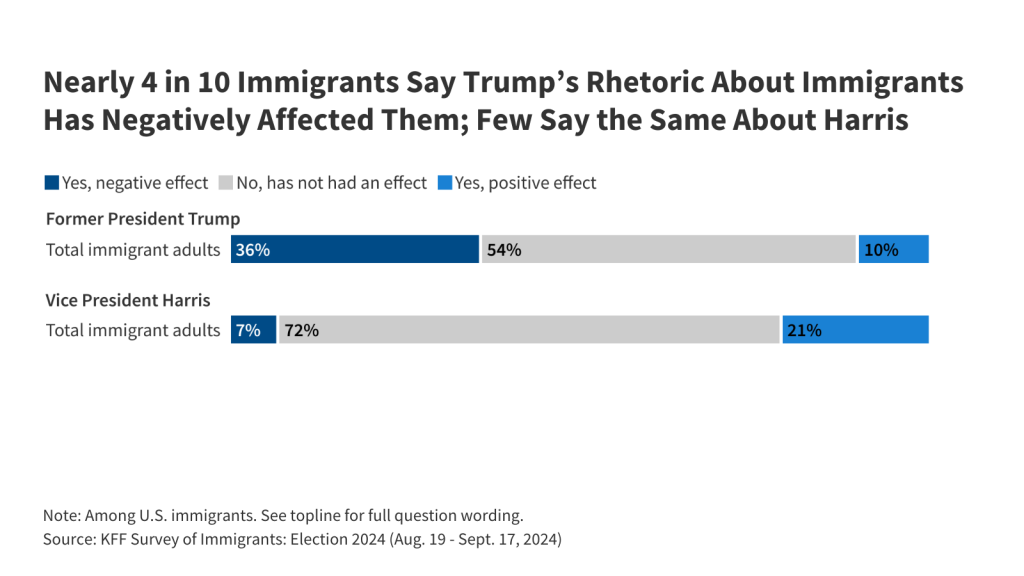
The independent source for health policy research, polling, and news.
Poll: As the Election Approaches, Most of the Public Say They Have Heard False Claims about Immigrants
Nearly 4 in 10 Immigrants Say that Former President Trump’s Rhetoric Has Harmed Them
With immigration and border security getting attention heading into November’s elections, a large majority of the public reports hearing false claims about immigrants from candidates or elected officials, and many immigrants say the rhetoric is negatively affecting how they are treated, a new KFF Health Misinformation Tracking Poll finds.
Fielded before the Sept. 10 debate between former President Trump and Vice President Harris, the poll tested the public’s awareness of, and belief in, several statements about immigrants, both false and true. A companion survey of immigrants examines their views and experiences during the campaign.
Most of the public say they have heard candidates or officials make the false claims that “immigrants are causing an increase in violent crime” (80%) and that “immigrants are taking jobs and causing an increase in unemployment for people born in the U.S.” (74%).
About one in five people wrongly say that each of those two false claims are “definitely true,” with similar shares saying they are “definitely false.” In each case, a majority falls somewhere in between, describing the claims as only “probably” true or false.
For many immigrants, campaign rhetoric can have tangible effects. Nearly four in ten (36%) immigrants – including almost half (45%) of Asian immigrants – say that the way former President Trump talks about immigrants has negatively affected the way they are treated. Few (7%) say the same about Vice President Harris’ rhetoric, while about one in five (21%), including three in ten (30%) Asian immigrants, say that her rhetoric has had a positive effect.

When asked about the potential outcome of the election for immigrants, a narrow majority (55%) of immigrants say they would be better off if Vice President Harris wins, roughly three times the share that say that they would be better off if former President Trump wins (19%). A quarter (26%) say that who the president would not make a difference in the lives of U.S. immigrants.
“Everyone is quick to point to social media as the source of misinformation, and it often is, but it’s candidates who are amplifying misinformation about immigrants. Our poll shows that they’re harming immigrants in the process,” said KFF President and CEO Drew Altman, who also wrote a new column on the issue following comments by former President Trump and Sen. J.D. Vance about Haitian immigrants in Springfield Ohio.
The poll of the public at large also reveals sharp differences among partisans in their likelihood to endorse those false claims.
Specifically, about four in ten (45%) Republicans say it is “definitely true” that immigrants are causing an increase in violent crime in the U.S., while a similar share (39%) of Democrats say this claim is “definitely false.” And about three in ten (31%) Republicans say the false claim about immigrants causing an increase in unemployment for U.S.-born people is “definitely true,” while nearly half (46%) of Democrats say it is “definitely false.”
Many People, Including Immigrants, Are Confused about Eligibility for Federal Health Benefits
The poll also gauges the public’s – and immigrants’ – understanding about immigrants’ eligibility for government benefits programs amid former President Trump’s false claims during the campaign that immigrants drain federal benefit programs and receive free government health care.
Half of the general public (51%) and immigrants (49%) do not realize that undocumented immigrants are not eligible for health insurance programs paid for by the federal government, either saying either that they aren’t sure or wrongly saying that they are eligible.
Similarly, half or more of the public and immigrants do not understand that most immigrants are not eligible for Social Security, Medicare, or Medicaid benefits as soon as they arrive in the U.S., saying either that they aren’t sure or wrongly saying that they are eligible immediately.
Under longstanding federal policy, most lawfully present immigrants, with some exceptions, are generally ineligible to enroll in federal benefit programs like Medicaid until they have resided in the U.S. for at least five years. Undocumented immigrants are ineligible for federally funded health insurance programs.
A related new KFF report explains these rules as well as other key facts about immigrants’ use of health care and its costs.
Designed and analyzed by public opinion researchers at KFF. The KFF Health Misinformation Tracking Poll was conducted August 26-Sept. 4, 2024, online and by telephone among a nationally representative sample of 1,312 U.S. adults in English and Spanish. Findings for immigrant adults are based on a separate nationally representative survey of 543 immigrant adults (people living in the U.S. who were born outside the U.S. and its territories). The survey of immigrants was conducted August 19-September 17, 2024 online and by telephone in English, Chinese, Spanish, Korean, and Vietnamese. The margin of sampling error is plus or minus 4 percentage points for total U.S. adults and 6 percentage points for immigrant adults. For results based on other subgroups, the margin of sampling error may be higher.